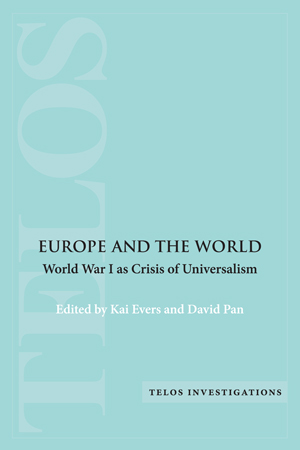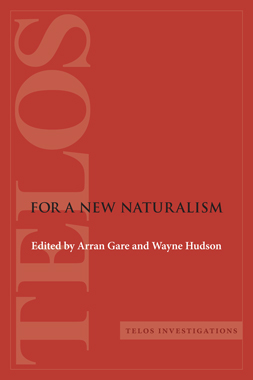By Telos Press · Tuesday, May 1, 2018 New from Telos Press: Europe and the World: World War I as Crisis of Universalism, edited by Kai Evers and David Pan. Order your copy in our online store, and save 20% on the list price by using the coupon code BOOKS20 during the checkout process.
 With contributions by Étienne Balibar, Annette Becker, Russell Berman, Jörn Leonhard, among many others, Europe and the World: World War I as Crisis of Universalism focuses within Europe on the conflicts between nationalism and cosmopolitanism as a universalist political project and globally on the conflicts between European imperial politics and universal ideals. This collection of essays probes how these conflicts defined the war as the transition point to a new structure of global relations and postcolonial understandings of cultural identity. The volume’s first part considers the history of European universalism and how it affected the lead-up to the war. The second part analyzes how universalist goals affected the conduct of the war itself. While August 1914 marked a simultaneous turning point in Europe, Africa, and Asia, the war ended without such global synchronicity. Instead, it gave way to a wide variety of new spaces and chronologies of violence on a global level. Part three offers case studies of how representations of the war affected its remembrance and the way such war stories subverted or fit into different national narratives. The contributions in part four investigate different ways in which the experience of war and mass violence affected national cultures and notions of universalism in the United States and within Europe. With contributions by Étienne Balibar, Annette Becker, Russell Berman, Jörn Leonhard, among many others, Europe and the World: World War I as Crisis of Universalism focuses within Europe on the conflicts between nationalism and cosmopolitanism as a universalist political project and globally on the conflicts between European imperial politics and universal ideals. This collection of essays probes how these conflicts defined the war as the transition point to a new structure of global relations and postcolonial understandings of cultural identity. The volume’s first part considers the history of European universalism and how it affected the lead-up to the war. The second part analyzes how universalist goals affected the conduct of the war itself. While August 1914 marked a simultaneous turning point in Europe, Africa, and Asia, the war ended without such global synchronicity. Instead, it gave way to a wide variety of new spaces and chronologies of violence on a global level. Part three offers case studies of how representations of the war affected its remembrance and the way such war stories subverted or fit into different national narratives. The contributions in part four investigate different ways in which the experience of war and mass violence affected national cultures and notions of universalism in the United States and within Europe.
Continue reading →
By Wayne Hudson and Arran Gare · Tuesday, February 6, 2018 For a New Naturalism, edited by Arran Gare and Wayne Hudson, is now available from Telos Press in our online store. Order your copy today and save 20% on the list price by using the coupon code BOOKS20 during the checkout process.
Contemporary political and social theory needs to be rethought with reference to posthistorical conditions and developments in the natural sciences. More emphasis needs to be placed on a wider naturalism that goes beyond modern objectivating naturalism: a naturalism that opens up to both differential naturalisms and to differential humanities. In place of critique without concrete alternatives and American identity politics, a version of enlightenment is needed that stands for the rational reform of human affairs in all areas. This enlightenment is not the mainstream European Enlightenment of the eighteenth century. It is not hostile to indigenous and premodern social traditions, but seeks to learn from them. Nor is it confined to Western social thought or to a political thought based on the citizens of cities. This enlightenment engages with the sciences and with global historical dynamics.
Continue reading →
By Telos Press · Friday, September 1, 2017 Telos Investigations is a new book series that collects papers delivered at Telos-Paul Piccone Institute conferences. The first volume in the series, For a New Naturalism, edited by Arran Gare and Wayne Hudson, is now available for purchase in our online store. Save 20% on the list price by using the coupon code BOOKS20 during the checkout process.
 Western civilization has been afflicted by a divide between the sciences and the humanities, a divide that has been harmful to both. The first volume in our new Telos Investigations series, For A New Naturalism elaborates the implications of recent developments in natural philosophy that challenge both Cartesian dualism and reductionism. The contributors to this volume write from a variety of political, philosophical, and scientific standpoints. They all agree, however, that a civilization based on reductionist naturalism, with its impoverished understanding of both human life and the universe, is failing to generate the political and social thought we need. And they all support the need for a wider naturalism than the objectivating naturalism that emerged in seventeenth-century Europe. In addressing the contested status of naturalism in contemporary philosophy, the contributions to this volume question both prevailing assumptions about nature and assumptions about what is knowledge. They argue for a new alliance between science and the humanities, and spell out some of the implications of this challenge for philosophy, society, and religion. Western civilization has been afflicted by a divide between the sciences and the humanities, a divide that has been harmful to both. The first volume in our new Telos Investigations series, For A New Naturalism elaborates the implications of recent developments in natural philosophy that challenge both Cartesian dualism and reductionism. The contributors to this volume write from a variety of political, philosophical, and scientific standpoints. They all agree, however, that a civilization based on reductionist naturalism, with its impoverished understanding of both human life and the universe, is failing to generate the political and social thought we need. And they all support the need for a wider naturalism than the objectivating naturalism that emerged in seventeenth-century Europe. In addressing the contested status of naturalism in contemporary philosophy, the contributions to this volume question both prevailing assumptions about nature and assumptions about what is knowledge. They argue for a new alliance between science and the humanities, and spell out some of the implications of this challenge for philosophy, society, and religion.
Continue reading →
|
|
 With contributions by Étienne Balibar, Annette Becker, Russell Berman, Jörn Leonhard, among many others, Europe and the World: World War I as Crisis of Universalism focuses within Europe on the conflicts between nationalism and cosmopolitanism as a universalist political project and globally on the conflicts between European imperial politics and universal ideals. This collection of essays probes how these conflicts defined the war as the transition point to a new structure of global relations and postcolonial understandings of cultural identity. The volume’s first part considers the history of European universalism and how it affected the lead-up to the war. The second part analyzes how universalist goals affected the conduct of the war itself. While August 1914 marked a simultaneous turning point in Europe, Africa, and Asia, the war ended without such global synchronicity. Instead, it gave way to a wide variety of new spaces and chronologies of violence on a global level. Part three offers case studies of how representations of the war affected its remembrance and the way such war stories subverted or fit into different national narratives. The contributions in part four investigate different ways in which the experience of war and mass violence affected national cultures and notions of universalism in the United States and within Europe.
With contributions by Étienne Balibar, Annette Becker, Russell Berman, Jörn Leonhard, among many others, Europe and the World: World War I as Crisis of Universalism focuses within Europe on the conflicts between nationalism and cosmopolitanism as a universalist political project and globally on the conflicts between European imperial politics and universal ideals. This collection of essays probes how these conflicts defined the war as the transition point to a new structure of global relations and postcolonial understandings of cultural identity. The volume’s first part considers the history of European universalism and how it affected the lead-up to the war. The second part analyzes how universalist goals affected the conduct of the war itself. While August 1914 marked a simultaneous turning point in Europe, Africa, and Asia, the war ended without such global synchronicity. Instead, it gave way to a wide variety of new spaces and chronologies of violence on a global level. Part three offers case studies of how representations of the war affected its remembrance and the way such war stories subverted or fit into different national narratives. The contributions in part four investigate different ways in which the experience of war and mass violence affected national cultures and notions of universalism in the United States and within Europe. 







